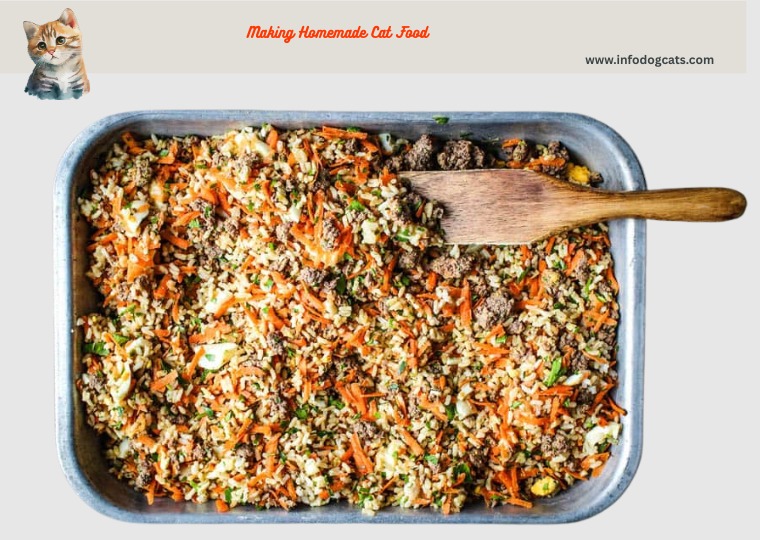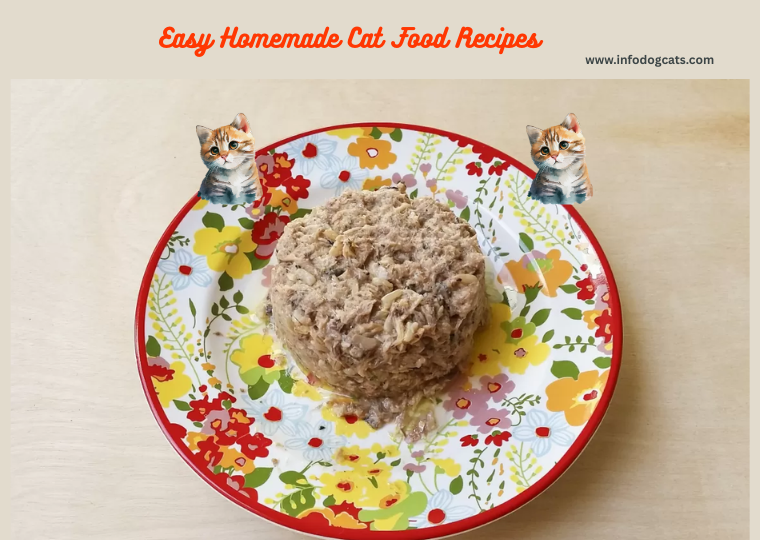Easy Cat Food Recipes Australia: A Simple Guide for Cat Lovers
Feeding your cat a healthy, balanced diet doesn’t have to mean relying on commercial products. Many Australian cat owners are turning to easy homemade cat food recipes to provide fresher, more natural nutrition — often at a lower cost. Whether your feline is a fussy eater or you simply prefer knowing exactly what goes into their bowl, homemade food offers peace of mind. In this article, we’ll explore simple recipes, nutrition tips, and expert advice to ensure your homemade meals are both safe and satisfying.
Why Choose Homemade Cat Food?
Cats are obligate carnivores, meaning they need a diet high in animal protein. Commercial food can be convenient, but some contain fillers or artificial additives. Homemade meals, when done right, can offer:
- Fresher ingredients
- No preservatives
- Customised nutrition
- Better for cats with allergies or sensitivities
Easy Homemade Cat Food Recipes
Here are two healthy and vet-reviewed homemade meals that Australian cat owners can easily prepare in their own kitchens.
Recipe 1: Hearty Beef & Rice Meal
A protein-packed meal that’s easy to portion and refrigerate.
Ingredients:
- 790g cooked organic brown rice
- 700g lean ground beef (cooked and drained)
- 4 hard-boiled eggs, peeled and diced (approx. 200g)
- 207g carrots, shredded or thinly sliced
- 14g minced flat-leaf parsley
- 22g olive or safflower oil
Instructions:
- Combine all ingredients in a large container.
- Stir until well mixed.
- Store in an airtight container in the fridge.
- Serve in portions according to your cat’s weight and dietary needs.
Tip: Make small daily portions to avoid spoilage. Use within 3 days.

Recipe 2: Chicken & Veggie Paté
This soft-textured recipe is perfect for cats who love smooth, savoury meals.
Ingredients:
- 1 cup cooked chicken (broiled or baked)
- ¼ cup steamed broccoli (mashed)
- ¼ cup steamed carrots (mashed)
- Chicken broth (low-sodium)
Instructions:
- Add ingredients to a food processor.
- Add a few tablespoons of broth.
- Puree until it forms a paté-like texture.
- Add more broth if needed, but avoid making it soupy.
- Let cool to room temperature before serving.
Note: Avoid using onions, garlic, or seasoning – these are toxic to cats.

What is the Best Homemade Food for Cats?
The best homemade food is high in protein, moderate in fat, and contains a small amount of carbohydrates. Recipes with chicken, turkey, beef, and lamb, combined with vegetables like carrots or broccoli, are great options. Always avoid toxic ingredients such as onion, garlic, chocolate, raisins, and alcohol. If your cat has specific health needs (e.g., kidney disease, diabetes, allergies), consult a vet before changing their diet.
What is the 25 Rule for Cat Food?
In Australia, pet food labelling follows guidelines that require at least 25% of the named ingredient if it appears in the product name. For instance, “Chicken Cat Food” must contain at least 25% chicken. This rule helps ensure transparency in commercial products — but with homemade food, you’re in full control of the ingredient ratios.
What Should Be the First 5 Ingredients in Cat Food?
Whether commercial or homemade, the top five ingredients in cat food should ideally include:
- Animal protein (e.g., chicken, beef, turkey, lamb)
- Animal fat or oils (e.g., chicken fat, fish oil)
- Whole grains or rice (optional, but digestible)
- Vegetables (e.g., carrots, peas, pumpkin)
- Supplements (e.g., taurine, vitamins – especially when homemade)
Taurine is essential for feline heart and eye health and must be added to homemade meals if not already present in the ingredients.
Is It Cheaper to Make Homemade Cat Food?
In many cases, yes. Buying in bulk and using leftovers (like plain cooked chicken) can reduce your cat care costs. However, it’s important to balance nutrients. You may need to invest in a pet-safe supplement to ensure the diet covers all essential needs, especially taurine, calcium, and certain B vitamins.
Cost savings should never compromise your cat’s health — always focus on quality over quantity.
Tips for Australian Cat Owners
- Choose locally sourced meats and produce for freshness.
- Avoid supermarket broth with onions, garlic, or salt.
- Freeze extra portions for later use.
- Talk to your vet before switching fully to homemade meals.
Homemade cat food can be a nutritious, affordable, and loving choice for your feline friend. By preparing meals at home, you gain control over ingredients and can cater to your cat’s unique preferences and sensitivities. Just remember: a balanced diet is key. Whether you start with simple recipes or explore more complex nutrition plans, your cat will appreciate the care and effort you put into every meal.
Homemade Cat Food: Save Money and Keep Your Cat Healthy Naturally
✅ Quick FAQs
Q: Can I feed homemade food every day?
A: Yes, as long as it’s nutritionally complete and balanced. Use supplements if needed.
Q: How do I know if my cat likes homemade food?
A: Start slowly by mixing homemade food with their usual meals. Watch for signs of enjoyment or digestive upset.
Q: Should I still give dry food?
A: You can combine both for convenience. Some owners use dry food as a backup.
Author: Katrina – Cat lover and founder of InfoDogCats.com
Bringing Australia’s cat community expert advice on health, food, and care.
